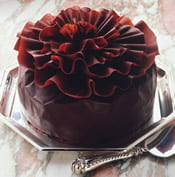Cakes and work
 Proverbs provide interesting insights into the ways speakers of different languages view the world. In Czech, for example, there are no cakes without work – bez práce nejsou koláče – which seems to imply that cakes are something worth having, but you can only have them if you work for them.
Proverbs provide interesting insights into the ways speakers of different languages view the world. In Czech, for example, there are no cakes without work – bez práce nejsou koláče – which seems to imply that cakes are something worth having, but you can only have them if you work for them.
Here are a few other Czech proverbs:
Co na srdci, to na jazyku = “what is in the heart, that on the tongue” – is used to tell people that they shouldn’t speak too frankly. Apparently the English equivalent of this one is “Dutch uncle”, though I’ve never heard it.
Host do domu, bůh do domu = “guest in the house, god in the house”, perhaps the equivalent of saying “my house is your house” to guests.
Host a ryba třetí den smrdí = “a guest and a fish stink on the third day” apparently the equivalent of “Guests and fish stink after three days”, another one I haven’t heard before. Perhaps “don’t outstay your welcome” is also an equivalent. It’s interesting that guests are equated with gods, but start to stink after three days.
Komu se nelení, tomu se zelení = “he who is not lazy shall get much green” or “he who is not lazy will be successful” – it’s interesting that green is associated with success. Perhaps it refers to the amount of land you won’t get if you’re lazy.
Žádný učený z nebe nespadl = “Wise men don’t fall from the sky” – knowledge doesn’t come easily. Like many proverbs, this one reminds people that effort is need in order to obtain something.
Kolik řečí znáš, tolikrát jsi člověkem = “How many languages you know, the more a person you are” or “You live a new life for every new language you speak. If you know only one language, you live only once.” – this is one of my favourite proverbs.
